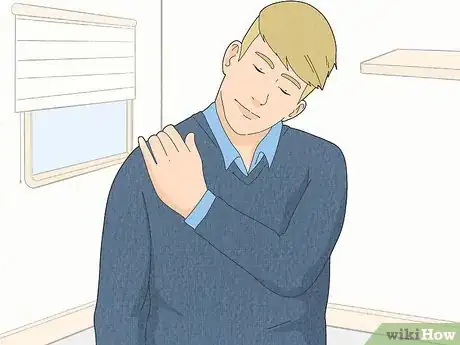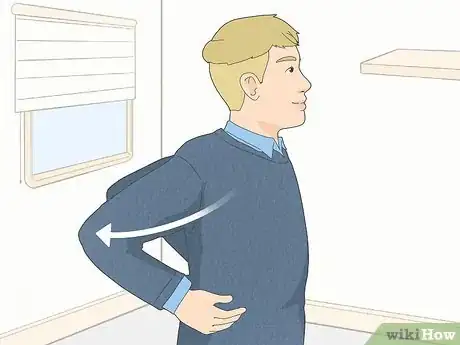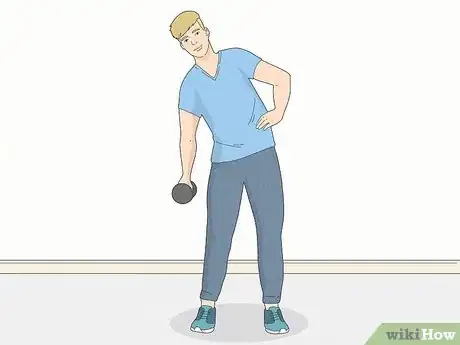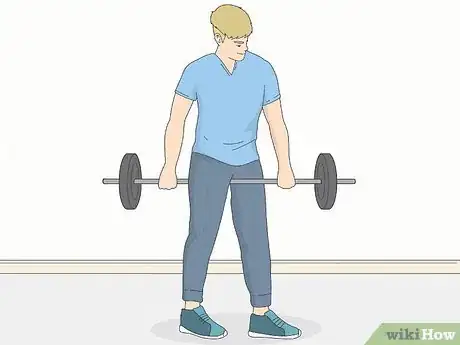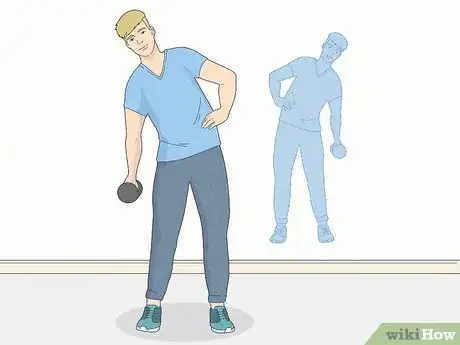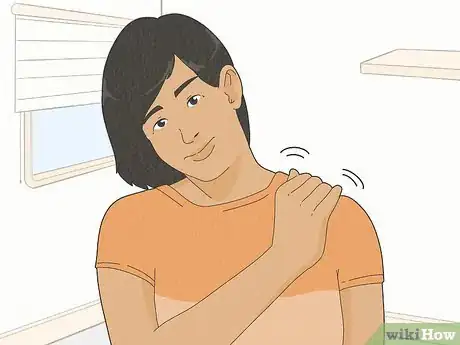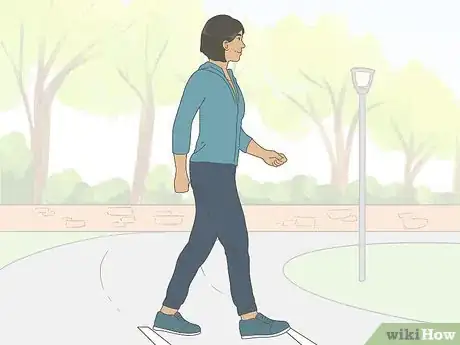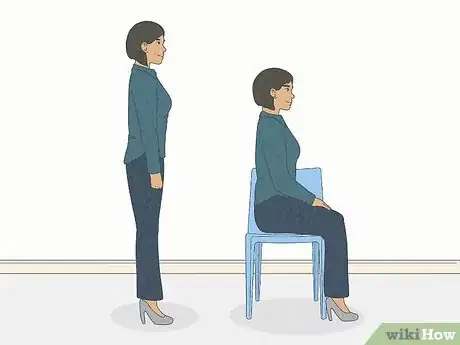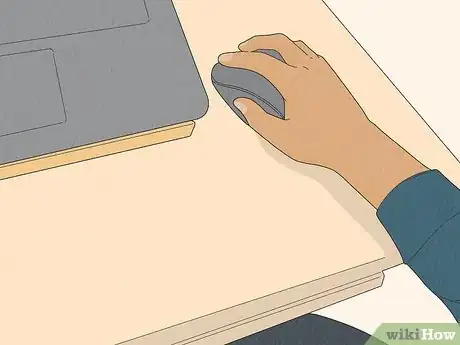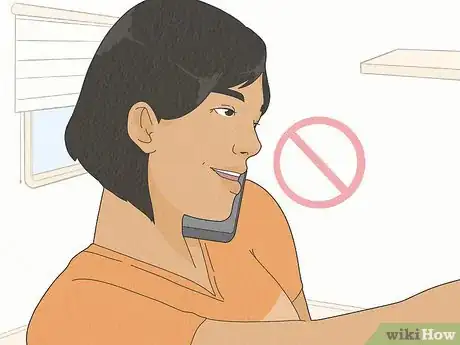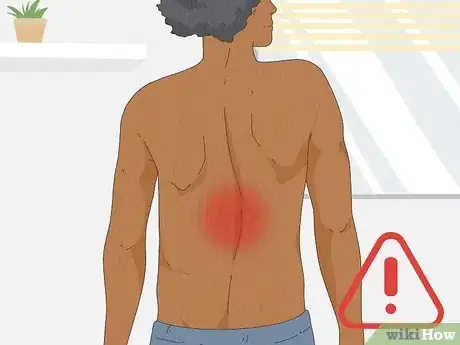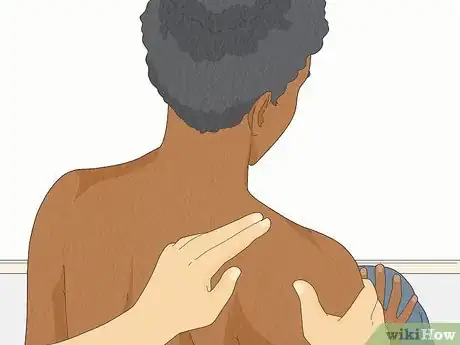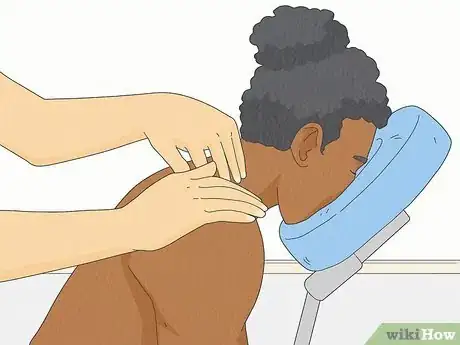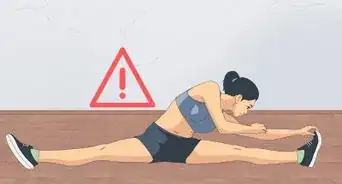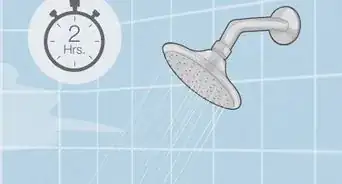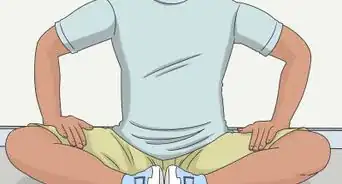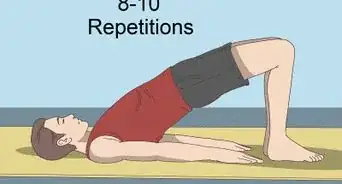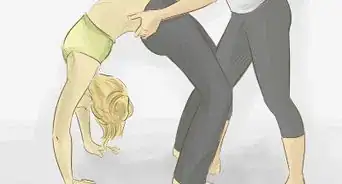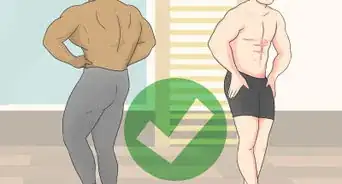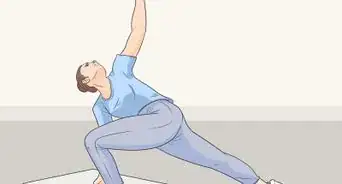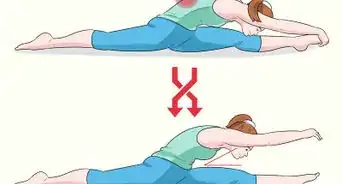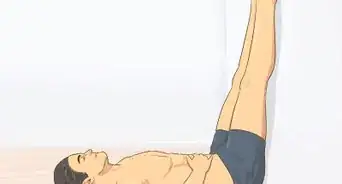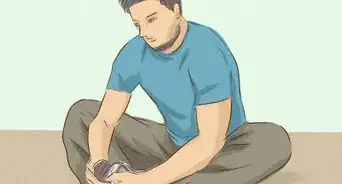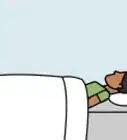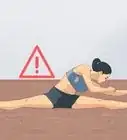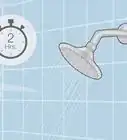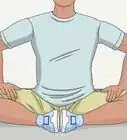This article was co-authored by Souad Gharib. Souad Gharib is the Founder of Female Trainer, a boutique women's gym based in West London, United Kingdom. Souad specializes in helping women reach their goals through exercise, nutrition, and counseling. Female Trainer offers personalized training sessions delivered by Souad and her experienced team of female trainers.
There are 14 references cited in this article, which can be found at the bottom of the page.
This article has been viewed 67,591 times.
If you have uneven traps, or trapezius muscles, then you’ve probably noticed that one of your shoulders is higher than the other. This could cause you some pain or discomfort, plus you might not like how it looks. You might naturally think that having uneven traps means you have to train harder, but this usually isn’t the case. Most of the time, the problem is with your posture and shoulder alignment, so you have to fix those first. Luckily, this is easy with some careful stretching, exercise, and everyday habits to bring your body back into balance.
Steps
Exercises and Stretches
-
1Bend your head towards your shoulder to stretch the muscles. Sometimes, one of your traps tightens up from overuse, which pulls one shoulder higher than the other. A simple stretch can fix this. Just bend your head like you’re trying to touch your ear to your shoulder. Hold this for a few seconds, then switch sides.[1] This is a good way to loosen your traps or warm up before exercising.
- For a bit more of a stretch, reach up and gently push your head towards your shoulder. You’ll feel a deeper stretch in your trap.
- A tighter trap muscle is more common on your dominant side because you use it more, so be sure to stretch out that side if it feels tight.
-
2Pinch your shoulder blades together to work your traps. This is a combination stretch and exercise that can even out your traps. Pull your shoulders back and pinch your shoulder blades together behind you. Hold this for a few seconds and release. Repeat this exercise as often as you have to.[2]
- This is a very easy exercise to do any time your traps feel tight. Do it a few times while you’re sitting at your desk at work to loosen up, for example.
- For more of a workout, attach resistance bands to a doorway or wall and back up so there’s some tension on the bands. Then pinch your shoulder blades together the same way.
Advertisement -
3Do side bends to bring your shoulders up to strength. This is a good exercise to correct misalignment in your traps. Stand with your feet shoulder-width apart and a dumbbell in one hand. Bend towards the side that you’re holding the dumbbell on so you feel a good stretch in your oblique, then pull yourself back up with your core.[3] Repeat this 8-10 times on one side, then switch to the other.
- Don’t use a very heavy dumbbell for this exercise. You could hurt your back with too much weight.
- If you’re just starting out, you can also do side bends without weights in your hand. Just complete the motion to stretch out your shoulders.
-
4Do Jefferson deadlifts to even out your trap muscles. This exercise is a little complicated, but it’s a great way to work your entire body evenly and avoid misalignments. Step over a barbell with your leg on the side that’s higher than the other so the bar is between your legs. Then squat down and grab the bar. Squeeze with your core and glutes to lift yourself up while keeping your back straight, then lower the bar back to the ground.[4]
- For example, if your right shoulder is higher, then step over the barbell with your right leg.
- This exercise forces you to stay square while you’re lifting the weight, so it’s also good for back and hip pain.
-
5Complete the same exercises on each side to stay even. No matter what exercises or stretches you do, always make sure you evenly train each side of your body. If you do more reps on one side or use different weights, then you’ll end up with imbalances, like uneven traps. Completing the same workouts should help even out your traps.[5]
- Also focus on using proper form with each exercise. If your form is off, you might be leaning towards one side, which can make your traps uneven.
Everyday Tips
-
1Massage your traps to stop them from tensing. Throughout the day, you might feel tightness or soreness in one of your traps. This can make the tight side lift higher than the other. For an easy solution, press and massage your tight trap with your fingers. This can make your muscles relax and lower your trap.[6]
- Use a theracane to hit spots that you can’t reach. This is a long cane that you can use to massage spots on your body that are hard to reach, and you can get one from a medical supply store. Press it into any sore or tight spots to loosen them.[7]
- If you have a partner, they can also massage your tight spots.
-
2Stay active by exercising every day. Staying sedentary can cause imbalances and misalignments throughout your body. If you’re not very active, this could be causing your uneven traps. Commit to getting some exercise every day to keep your body aligned and strong.[8]
- The official recommendation is for 150 to 300 minutes of moderate exercise spread throughout every week.[9] This breaks down to at least 30 minutes on 5 days.
- You don’t have to workout hard. A 30-minute walk is great exercise.
-
3Stand and sit with proper posture. Your posture could be to blame for your uneven shoulders too. Whether you’re sitting or standing, always straighten your spine and keep your shoulders back. Press your chin up to prevent your neck from hunching.[10] Never slouch over or lean to the side. Staying crooked like this can pull your shoulders, back, and hips out of alignment.
- Some good exercises to help correct your posture include planks, leg raises, and bridges.
- If you sit for long periods, getting a high-quality chair with good back support can help maintain your posture.
-
4Keep your mouse close to you while you’re on the computer. This is a common way that people pull their shoulders out of alignment. If you work on a computer, like a lot of people, don’t reach forward to use your mouse. Keep it close to you so your upper arm stays parallel with your torso instead of reaching outward. This prevents your mouse arm from getting too tight.[11]
- Depending on the type of desk you have, this might be hard. Placing your mouse on a small table or chair next to you can help.
- If you use a laptop, try getting a wireless mouse instead of using the touchpad. This way, you can keep the mouse at your side instead of reaching forward.
-
5Avoid holding a phone between your shoulder and ear. This is another common habit that can cause one of your traps to tighten up. Don’t pinch your phone between your shoulder and ear to talk. This throws your neck and shoulder out of whack and could cause pain later on.[12]
- If you talk on the phone a lot, a hands-free headset can be a big help.
Medical Treatments
-
1Get tested for scoliosis if you also have back pain and imbalances. Uneven shoulders can actually be an early sign of scoliosis. This is a condition where your spine twists to the side. If your shoulders are uneven and you also feel like your back leans to the side or your hips stick out on one side, then see your doctor as soon as possible. If you do have scoliosis, then early treatment is important to get you back to normal.[13]
- If you are diagnosed with scoliosis, don’t panic! It’s a manageable condition and you might need pain medication or a back brace to correct your spine.
- In rare cases, surgery can correct scoliosis as well.
-
2Complete physical therapy if your muscles are uneven. If you’ve tried stretching and exercising on your own to fix your traps without success, then you may need a round of physical therapy. When you visit a physical therapist, they will massage and manipulate your muscles to loosen them up. They’ll probably also stretch and exercise with you to condition your muscles correctly.[14] This can help strengthen your muscles and correct your trap misalignment.
- The physical therapist will probably give you some stretches and exercises to do at home, so make sure you complete all your assignments for a full recovery.
- You may need a prescription or referral to see a physical therapist. In this case, see your regular doctor first.
-
3Visit a chiropractor if conventional treatments don’t work. Chiropractors specialize in manipulating your spine and neck to correct pain and misalignment. These treatments could help bring your shoulders back into balance. If exercise and physical therapy haven’t worked for you, then try visiting a chiropractor to see if this helps.[15]
- Keep in mind that chiropractic techniques aren’t always accepted by the medical community. However, many people find them helpful, so it could work for you.
Expert Q&A
-
QuestionHow do you loosen tight upper traps?
 Souad GharibSouad Gharib is the Founder of Female Trainer, a boutique women's gym based in West London, United Kingdom. Souad specializes in helping women reach their goals through exercise, nutrition, and counseling. Female Trainer offers personalized training sessions delivered by Souad and her experienced team of female trainers.
Souad GharibSouad Gharib is the Founder of Female Trainer, a boutique women's gym based in West London, United Kingdom. Souad specializes in helping women reach their goals through exercise, nutrition, and counseling. Female Trainer offers personalized training sessions delivered by Souad and her experienced team of female trainers.
Exercise & Wellness Specialist Stand up tall and clasp your hands together, interlocking your fingers. Pull them apart and turn your hands outwards, keeping them interlocked, so your palms are facing away from you, rounding off your upper back.
Stand up tall and clasp your hands together, interlocking your fingers. Pull them apart and turn your hands outwards, keeping them interlocked, so your palms are facing away from you, rounding off your upper back.
References
- ↑ https://youtu.be/yL7hpJU50qc?t=147
- ↑ https://youtu.be/yL7hpJU50qc?t=285
- ↑ https://www.self.com/gallery/obliques-exercises
- ↑ https://youtu.be/A9-FlE5uCwM?t=8
- ↑ https://youtu.be/ZquaIwBHabo?t=62
- ↑ https://youtu.be/yL7hpJU50qc?t=147
- ↑ https://youtu.be/ZquaIwBHabo?t=314
- ↑ https://www.ncbi.nlm.nih.gov/pmc/articles/PMC5684019/
- ↑ https://www.hhs.gov/fitness/be-active/physical-activity-guidelines-for-americans/index.html
- ↑ https://www.nhs.uk/live-well/exercise/common-posture-mistakes-and-fixes/
- ↑ https://youtu.be/yL7hpJU50qc?t=257
- ↑ https://www.nhs.uk/live-well/exercise/common-posture-mistakes-and-fixes/
- ↑ https://www.nhs.uk/conditions/scoliosis/
- ↑ https://orthoinfo.aaos.org/en/diseases--conditions/shoulder-injuries-in-the-throwing-athlete/
- ↑ https://www.ncbi.nlm.nih.gov/pmc/articles/PMC2504982/
- ↑ https://youtu.be/yL7hpJU50qc?t=98
